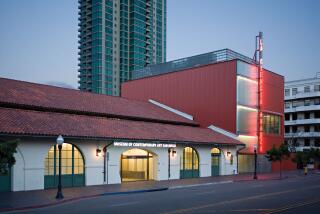Sweatshop Exhibit Has Nowhere to Go
- Share via
The Smithsonian Institution said it will not be taking a controversial exhibit about sweatshops on the road because it can’t find enough museums interested in accepting the display.
Museums in San Francisco, Chicago and New York turned down the exhibit, which includes a re-creation of an El Monte sweatshop that was raided by authorities in 1995.
While Cal State L.A. had expressed interest in hosting the exhibit, the Smithsonian said it decided not to display it there because it would be too costly to ship the elaborate show to only one city.
*
The Smithsonian’s decision is a public relations coup for the apparel industry, which opposed the exhibit. Apparel manufacturers said the depiction of the El Monte sweatshop, where about 70 Thai immigrants labored against their will, is misleading and unfair to the industry.
“I feel vindicated that someone heard us,” said Ilse Metchek, executive director of the Los Angeles-based California Fashion Assn., a vocal critic of the exhibit.
Exhibit curator Peter Liebhold of the Smithsonian said there are no signs that the industry pressured museums to reject the exhibit. But he said that various museum directors expressed concern about how the apparel industry and other businesses would react if their institutions hosted the exhibit. He declined to name the museums that turned him down.
“Increasingly, museums look to corporate money for survival,” Liebhold said. “For that reason, many institutions were sensitive to how some might perceive the exhibit. . . . I think it was a case of self-induced censorship.”
Along with the California Fashion Assn., which represents apparel makers in the Southland, San Francisco Fashion Industries and the American Apparel Manufacturers Assn., a national trade group, opposed the exhibit.
*
California Labor Commissioner Jose Millan, who participated in the El Monte raid, expressed disappointment.
“I think the exhibit is fair and balanced and of benefit to the apparel industry,” Millan said. “It was an opportunity to educate the public about industry problems.”
Assistant U.S. Atty. Michael Gennaco, who successfully prosecuted the Thai nationals who operated the infamous sweatshop, said: “It’s a shame. A traveling exhibit could have opened eyes.”
A spokesman for Cal State L.A. had no comment on the cancellation in Los Angeles.
The exhibit, which opened at the Smithsonian in Washington in April, will continue on display there through February.
*
Seven people were convicted on various charges for operating the El Monte sweatshop and sentenced to prison terms ranging from two to seven years. Two suspects in the case eluded authorities. The Thai laborers, most of them women, were allowed to remain in the United States.
More to Read
Sign up for Essential California
The most important California stories and recommendations in your inbox every morning.
You may occasionally receive promotional content from the Los Angeles Times.









